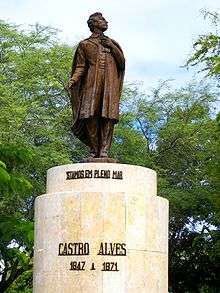Castro Alves
| Castro Alves | |
|---|---|
 Castro Alves, c. 1870 | |
| Born |
Antônio Frederico de Castro Alves March 14, 1847 Curralinho, Bahia, Empire of Brazil |
| Died |
July 6, 1871 (aged 24) Salvador, Bahia, Empire of Brazil |
| Occupation | Poet, playwright |
| Nationality | Brazilian |
| Alma mater | University of São Paulo |
| Genre | Poetry, theatre |
| Subject | Abolitionism, Republicanism, love |
| Literary movement | Romanticism |
| Notable works | Espumas Flutuantes, Vozes d'África, O Navio Negreiro |
| Partner | Eugênia Câmara |
| Relatives | José Antônio da Silva Castro |
|
| |
| Signature |
 |
Antônio Frederico de Castro Alves (March 14, 1847 – July 6, 1871) was a Brazilian poet and playwright, famous for his abolitionist and republican poems. One of the most famous poets of the "Condorism", he won the epithet of "O Poeta dos Escravos" ("The Poet of the Slaves").
He is the patron of the 7th chair of the Brazilian Academy of Letters.
Life

Castro Alves was born in the town of Curralinho (renamed "Castro Alves" in his honor in 1900), in the Brazilian state of Bahia, to Antônio José Alves, a medician, and Clélia Brasília da Silva Castro, one of the daughters of José Antônio da Silva Castro (a.k.a. "Periquitão", Portuguese for "Big Parakeet"), a prominent fighter in the 1821–23 Siege of Salvador. In 1853, he was sent to study in the Colégio Sebrão, run by Abílio César Borges, the Baron of Macaúbas. There, he would meet and befriend Ruy Barbosa.
In 1862, he moved to Recife in order to study at the Faculdade de Direito do Recife, but he was rejected twice. He only was able to join the college in 1864, there meeting Tobias Barreto and José Bonifácio the Younger (step-grandson of famous statesman José Bonifácio). They would heavily influence Alves' writing style, and in turn, Alves also influenced them both. His father would die in 1866, and short after, he met Portuguese actress Eugênia Câmara, and would start dating her afterwards.
In 1867, Alves returns to Bahia alongside Câmara, and there he writes his drama Gonzaga, ou A Revolução de Minas, based on the life of famous Luso-Brazilian Neoclassic poet Tomás António Gonzaga and his participation in the failed 1789 Minas Conspiracy. In the following year, he and Câmara would go to São Paulo, where Alves entered the Faculdade de Direito da Universidade de São Paulo and once more would meet Ruy Barbosa. In there, he also befriended Pedro Luís Pereira de Sousa, and wrote a poem named "Deusa incruenta", based on Sousa's work "Terribilis Dea". His play Gonzaga would be performed on the end of 1868, being well received by critics and public alike, but Alves was sad because his romantic engagement with Eugênia Câmara had terminated.
During a hunting trip in the same year, Alves received an accidental shotgun shot in his left foot, that had to be amputated due to the menace of gangrene. However, a prosthesis was made for him, and thus he was able to walk again (although with the use of an assistive cane). He would spend the year of 1870 in his home-state of Bahia, trying to recover from the tuberculosis he got while in São Paulo. Also in 1870, Alves published the poetry book Espumas Flutuantes – the only work he would publish during his lifetime. All his other works would receive a posthumous publication.
Alves' attempts to mitigate the tuberculosis were in vain; he would die on 6 July 1871, in the city of Salvador, at 24 years old.

Works
- Espumas Flutuantes (1870)
- Gonzaga, ou A Revolução de Minas (1875)
- A Cachoeira de Paulo Afonso (1876)
- Vozes d'África (1880)
- O Navio Negreiro (1880)
- Os Escravos (1883)
Alves also translated into Portuguese many poems by Victor Hugo, and Lord Byron's "Darkness" and "Lines Inscribed Upon a Cup Formed from a Skull". They can be found on Espumas Flutuantes.
Representations in popular culture
Alves was portrayed by Paulo Maurício in the 1949 film Vendaval Maravilhoso, loosely based on Jorge Amado's 1941 book The ABC of Castro Alves, and by Bruno Garcia in Silvio Tendler's 1999 documentary Castro Alves: Retrato Falado do Poeta.
External links
| Portuguese Wikisource has original text related to this article: |
| Wikimedia Commons has media related to Castro Alves. |
- Castro Alves' biography at the official site of the Brazilian Academy of Letters (in Portuguese)
- Works by or about Castro Alves at Internet Archive
- Works by Castro Alves at LibriVox (public domain audiobooks)

| Preceded by New creation |
Brazilian Academy of Letters – Patron of the 7th chair |
Succeeded by Valentim Magalhães (founder) |
.svg.png)
